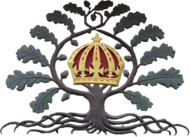Political ideology advocating traditional morals and social order
Traditionalist conservatism , often known as classical conservatism , is a political and social philosophy that emphasizes the importance of transcendent moral principles, manifested through certain posited natural laws to which it is claimed society should adhere. It is one of many different forms of conservatism . Traditionalist conservatism, as known today, is rooted in Edmund Burke 's political philosophy, which represented a combination of Whiggism and Jacobitism ,[failed verification as well as the similar views of Joseph de Maistre , who attributed the rationalist rejection of Christianity during previous decades of being directly responsible for the Reign of Terror which followed the French Revolution .[ 2] [ 3] social ties and the preservation of ancestral institutions above what they perceive as excessive rationalism and individualism . One of the first uses of the phrase "conservatism" began around 1818 with a monarchist newspaper named "Le Conservateur ", written by Francois Rene de Chateaubriand with the help of Louis de Bonald .
The modern concepts of nation , culture , custom , convention , religious roots, language revival , and tradition are heavily emphasized in traditionalist conservatism. Theoretical reason is regarded as of secondary importance to practical reason . The state is also viewed as a social endeavor with spiritual and organic characteristics. Traditionalists think that any positive change arises based within the community 's traditions rather than as a consequence of seeking a complete and deliberate break with the past. Leadership , authority , and hierarchy are seen as natural to humans. Traditionalism, in the forms of Jacobitism , the Counter-Enlightenment and early Romanticism , arose in Europe during the 18th century as a backlash against the Enlightenment , as well as the English and French Revolutions . More recent forms have included early German Romanticism , Carlism , and the Gaelic revival . Traditionalist conservatism began to establish itself as an intellectual and political force in the mid-20th century.[ 5]


